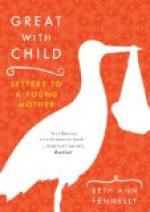Why, where can you find the individual who is not a slave to this perpetual rage within—this perpetual cry, “Who will show us any” physical “good”? Who, in this land of abundance, will eat or drink plain things? Who will eat simple bread, meat, potatoes, rice, pudding, apples, &c. or drink simple water? A few instances may be found, of late, in which people confine themselves to simple water for drink; but they are rather rare. And no wonder. They must be rare so long as an unnatural thirst is kept up everywhere by the most exciting and most strange mixtures of food. Where, I again ask, is the person who will eat and relish plain bread, plain meat, plain puddings, &c.? Certainly not in the nursery. No young mother—scarcely one I mean—will, for a single meal, confine herself to a piece of bread, the sweetest and best food in the whole world, unless it is hot, or toasted, or soaked, or buttered. A natural, healthy appetite, is as rare a thing on our planet, almost, as an inhabitant of the sun or moon.
I have seen more than one mother made sick by using, while nursing, improper food and drink. I have known milk punch, taken by stealth—(because how could the mother, it was said, ever have a supply of food for her poor child without it!)—to kindle a fever that came very near burning up the mother and child both. And yet, if I have once or twice succeeded in convincing the mother that she was only suffering the natural punishment of her own transgressions, I have never, so far as I now recollect, succeeded in making her believe that her iniquities were visited upon her unoffending infant.
There is everywhere the most painful apathy on this most painful subject. We see little children of all ages, everywhere, the victims of debility, and pain, and suffering, and disease and death, and yet we very seldom seem to search for one moment for the causes of this premature destruction. In fact most parents—even many intelligent mothers—at once stare, if you attempt to inquire into the causes of their child’s death, as if it was either a kind of sacrilege, or an impeachment of their own parental affection. Diseases, even at this day, with the sun of science blazing in meridian splendor, they seem to regard as the judgments of heaven; and to think of tracing out the causes of the early death of half our race, is, in their estimation, not only idle, but wicked.




